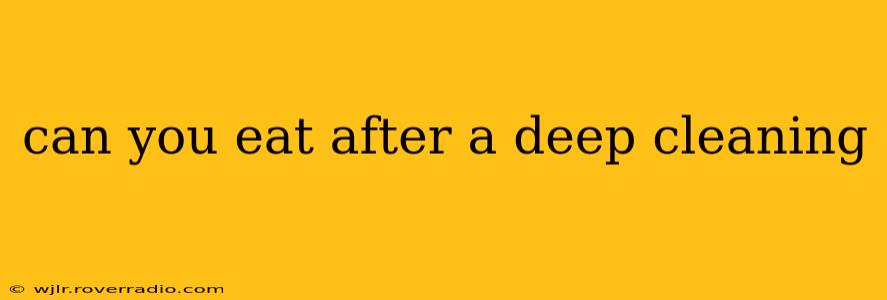A deep cleaning at the dentist can leave your mouth feeling a little sensitive, and it's natural to wonder about eating and drinking afterward. The short answer is yes, you can eat after a deep cleaning, but it's crucial to do so carefully and strategically to promote healing and avoid discomfort. This guide will delve into the specifics, addressing common questions and concerns.
What is a Deep Cleaning (Scaling and Root Planing)?
Before we discuss post-procedure eating, let's clarify what a deep cleaning entails. A deep cleaning, also known as scaling and root planing, is a more intensive procedure than a regular teeth cleaning. It's necessary for individuals with gum disease (periodontal disease) to remove plaque and tartar buildup beneath the gum line. This process can leave your gums slightly sore and sensitive.
Can You Eat Immediately After a Deep Cleaning?
While you can eat after a deep cleaning, it's generally recommended to wait for a while. Immediately after the procedure, your mouth might be numb from the anesthetic, making it difficult to eat safely and increasing the risk of biting your cheek or tongue. The sensitivity in your gums might also make eating anything too hot, cold, or abrasive uncomfortable. Waiting for at least a few hours, or until the numbness subsides, is usually advisable.
What Can You Eat After a Deep Cleaning?
The key is to choose soft, non-irritating foods for the first few days post-procedure. Here are some suggestions:
- Soft fruits: Mashed bananas, applesauce, or ripe peaches are good options.
- Smoothies: Blend fruits, vegetables, and yogurt for a nutritious and easy-to-consume meal.
- Yogurt: Plain yogurt is gentle on the gums and provides beneficial probiotics.
- Oatmeal: Cooked oatmeal is soft and easy to chew.
- Scrambled eggs: Softly cooked eggs are another good choice.
- Soups: Broth-based soups are gentle on the gums, providing hydration and nourishment.
- Pasta (soft): Well-cooked pasta without hard pieces is acceptable.
- Well-cooked vegetables: Soft vegetables like carrots (pureed or very well-cooked) are better than raw options.
What Foods Should You Avoid After a Deep Cleaning?
Avoid foods that are:
- Hard or crunchy: Nuts, chips, hard candies, and popcorn can irritate your gums and potentially damage the treated areas.
- Hot or cold: Extreme temperatures can further sensitize your gums. Stick to lukewarm foods and drinks.
- Acidic: Acidic foods and drinks, such as citrus juices, soda, and tomatoes, can irritate the gums.
- Spicy: Spicy foods can also cause discomfort.
- Tough to chew: Steaks, chewy meats, and other difficult-to-chew foods should be avoided initially.
How Long Does Sensitivity Last After a Deep Cleaning?
The level of sensitivity varies from person to person. Some experience minimal discomfort, while others might experience more significant sensitivity for a few days or even a week. Over-the-counter pain relievers, such as ibuprofen or acetaminophen, can help manage any discomfort. Rinsing with salt water can also help soothe irritated gums.
What If I Have Extreme Pain or Bleeding After a Deep Cleaning?
While some bleeding and discomfort are normal, excessive bleeding or persistent, severe pain should be reported to your dentist immediately. This could indicate an issue that needs attention.
Will I Need Special Care After a Deep Cleaning?
Following your dentist’s post-operative instructions is paramount. This often includes a specific rinsing regimen and dietary recommendations for optimal healing. Maintain good oral hygiene practices, brushing and flossing gently.
By following these guidelines and listening to your body, you can enjoy a comfortable recovery after your deep cleaning and maintain healthy gums. Remember, every individual's healing process is unique; always consult with your dentist if you have any concerns or experience unexpected issues.
